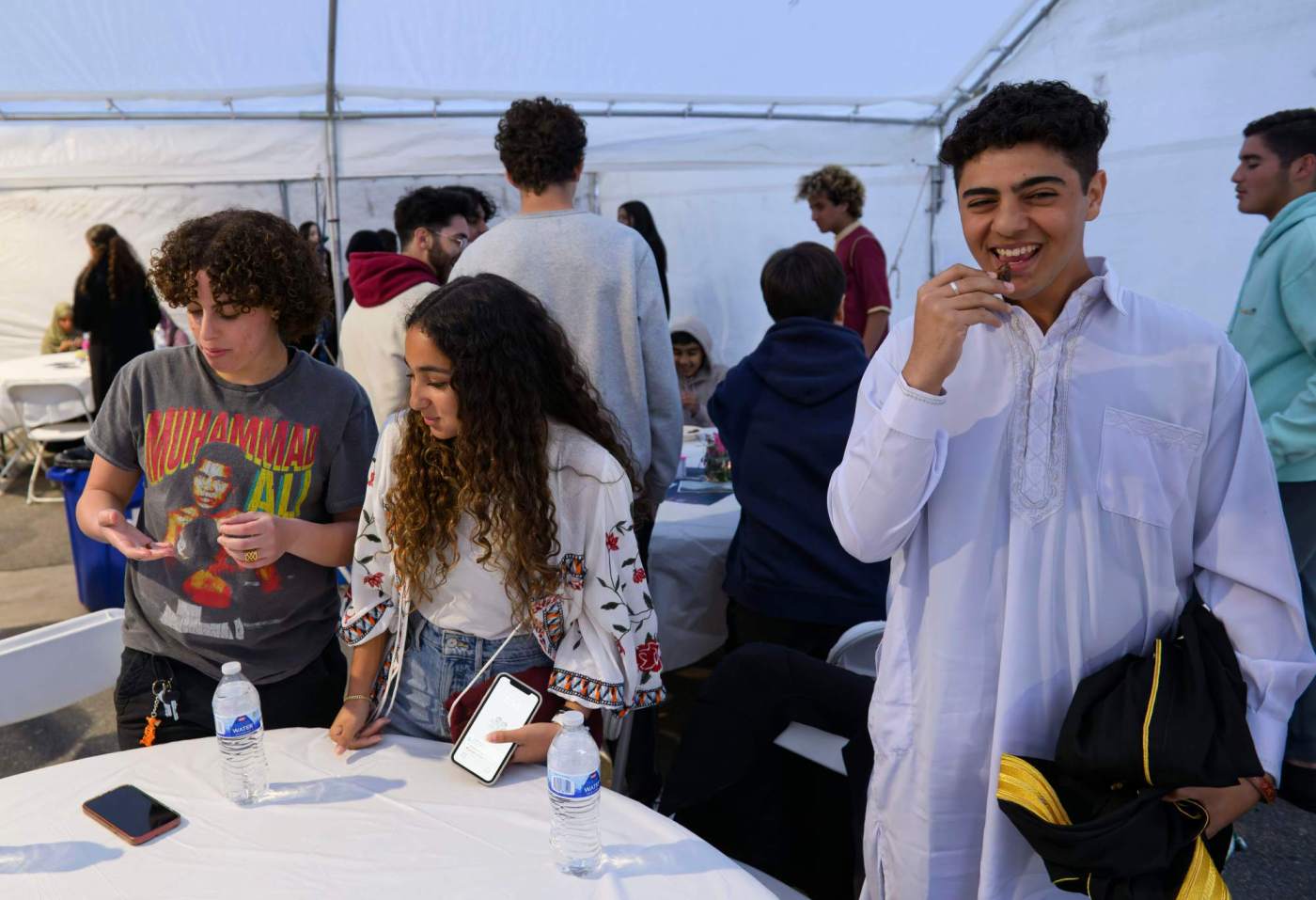Soon after Portola High student Bayan Shinaishin helped her varsity lacrosse team defeat Laguna Hills on March 27, she texted the family group chat: “SO HUNGRY.”
The sophomore played the game while observing the Ramadan fast and wanted shawarma for dinner.
“I had a really good game. I was only thinking about food the entire time. I guess that was my motivation,” Shinaishin said. “My position is defense. I’m in charge of making sure that nobody gets the ball and nobody scores so I feel like I did my job really well that day.”
This year, the Muslim holy month Ramadan, which is dependent on the lunar cycle, falls during the school year, leading students to navigate academics with the almost 14-hour fast. Ramadan started on Thursday, March 23, and is expected to last 30 days.
And student-athletes like Shinaishin abstain from food and drink, even water, while also playing a sport.
“It’s definitely a challenge, especially when you’re running up and down the field,” Shinaishin said. “I come out sometimes when it’s hard to breathe because I’m really thirsty. Other than that, I kind of pace myself.”
Her coach and teammates, she said, have been “super supportive” with some even offering not to eat around her.
Raya Abu-Tarif, a sophomore on the track and field team at Northwood High School in Irvine found a different type of support: her three Muslim teammates who also fast. The fast is easier, she said, because they are doing it with her.
“Religion is No. 1, it’s the top priority. So obviously that would come before the sport,” Abu-Tarif said on why she fasts while being an athlete. “I also still love the sport which is why I keep doing it.”
On the first day of Ramadan, Abu-Tarif — who competes in 100m, 200m, long jump and triple jump — had just completed the 200m race when it was time to break her fast. While she didn’t win, she set a personal best time in the race, she said.
For both Shinaishin and Abu-Tarif, hydration during the times they can eat has been key in being able to compete.
“I make sure to eat lots of fiber; I drink about two to four bottles of water,” Shinaishin said. “And I eat a lot of bananas.”
Electrolyte drinks also help Mohammed Hesham Tabbaa, a Northwood High senior and varsity lacrosse player, stay hydrated, especially on days before games. In addition, Tabbaa eats protein-rich meals at iftar (the time to break fast at sunset) and carb-heavy dishes at suhoor (when fasting begins at sunrise).
Still, fasting has impacted his game, Tabbaa said, noting he has lost his standard stamina and endurance.
“I have a very forgiving and understanding team where if I’m running low or I need to take a break, my coach is very quick to let me run off onto the side, take a breather and then lets me go back in when I’m ready,” Tabbaa said. “It’s really comforting to have people who are not scared or treat me differently just because I’m fasting or I’m not shoved to the side because I can’t perform as well as I usually can.”
Finding comfort in the support from his coach and teammates, Tabbaa said he hopes to host them for an iftar soon: “We’ve been joking about that in our group chat because we do weekly team dinners, saying we should do a team dinner iftar edition and have a whole bunch of Middle Eastern dishes.”
Outside of sports, Tabbaa has had seven friends in his circle fast with him.
“Religion comes first, and that is my first priority, and then of course my academics and my sports,” Tabbaa said. “I don’t think your daily life should be used as an excuse to get away from Ramadan or to not build that connection (with God).”
While twins Narmeen and Ameen Mahmood do not play a sport, the Rancho Santa Margarita Intermediate School seventh graders have altered routines because of Ramadan.
For Ameen Mahmood, it has meant no video games in the evenings. Instead, he sleeps early or reads the Quran.
“I do take naps right after school. I’ll just be so exhausted,” Narmeen Mahmood said. “We go for tharaweeh (evening prayers), but we don’t stay that long because we have to wake up early for school and the bus.”
And when she wakes up for suhoor at 5 a.m., Narmeen Mahmood said, she does not go back to bed. Instead, she prefers to stay up and read the Quran or Islamic books.
Given the disruptions in sleep schedules and the exhaustion that comes with that, Ameen Mahmood worried about his P.E. class but then found that the teachers at his school were understanding.
“If you give them a note explaining that it’s Ramadan and you are fasting, they’ll just let you opt out of any activity you don’t feel like you can do,” Ameen Mahmood.
Ahead of Ramadan, a community liaison was invited to attend staff meetings at Irvine Unified School District to share information about the holy month and what students, who are fasting, may experience that could impact their participation in school. Students or their families can connect with teachers, coaches and other school staff who will help put accommodations in place if needed, a spokesperson said.
Related Articles
Seven springtime Indian festivals to be celebrated in one Irvine park
Red tags expected to be removed from three San Clemente landslide buildings
Owners of Balboa Island Ferry asking for more time to convert to electric engines
Santa Ana unveils refurbished basketball court, new mural
Street medicine pilot launches in Garden Grove





